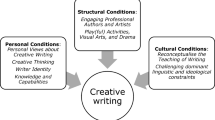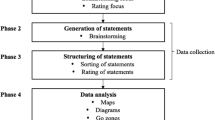Abstract
An outcome of science education is that young people have the understandings and skills to participate in public debate and make informed decisions about science issues that influence their lives. Toulmin’s argumentation skills are emerging as an effective strategy to enhance the quality of evidence based decision making in science classrooms. In this case study, an Australian science teacher participated in a one-on-one professional learning session on argumentation before explicitly teaching argumentation skills to two year 10 classes studying genetics. Over two lessons, the teacher used whole class discussion and writing frames of two socioscientific issues to teach students about argumentation. An analysis of classroom observation field notes, audiotaped lesson transcripts, writing frames and student interviews indicate that four factors promoted student argumentation. The factors are: the role of the teacher in facilitating whole class discussion; the use of writing frames; the context of the socioscientific issue; and the role of the students. It is recommended that professional learning to promote student argumentation may need to be tailored to individual teachers and that extensive classroom based research is required to determine the impact of classroom factors on students’ argumentation.
Similar content being viewed by others
References
Albe, V. (2008). When scientific knowledge, daily life experience, epistemological and social considerations intersect: students’ argumentation in group discussion on a socioscientific issue. Research in Science Education, 38(1), 67–90. doi:10.1007/s11165-007-9040-2.
Aufschnaiter, C., Erduran, S., Osborne, J., & Simon, S. (2008). Arguing to learn and learning to argue: case studies of how students’ argumentation relates to their scientific knowledge. Journal of Research in Science Teaching, 45(1), 101–131. doi:10.1002/tea.20213.
Bryce, T. (2004). Tough acts to follow: the challenges to science teachers presented by biotechnological progress. International Journal of Science Education, 26(4), 717–733. doi:10.1080/0950069032000138833.
Dawson, V. M., & Taylor, P. C. (2000). Do adolescents’ bioethical decisions differ from those of experts? Journal of Biological Education, 34(4), 1–5.
Dawson, V., & Venville, G. (in press). High school students’ informal reasoning and argumentation about biotechnology: An indicator of scientific literacy? International Journal of Science Education, accepted February 18th, 2008.
Dawson, V., & Venville, G. (2008, April). Argumentation and conceptual understanding: Grade 10 students learning about genetics. A paper presented at the annual international conference of the National Association for Research in Science Teaching (NARST), Baltimore, 30th March–2nd April.
Driver, R., Newton, P., & Osborne, J. (2000). Establishing the norms of scientific argumentation in classrooms. Science Education, 84(3), 287–312. doi:10.1002/(SICI)1098-237X(200005)84:3<287::AID-SCE1>3.0.CO;2-A.
Hand, B., Hohenshell, L., & Prain, V. (2004a). Exploring students’ responses to conceptual questions when engaged with planned writing experiences: a study with year 10 science students. Journal of Research in Science Teaching, 41(2), 186–210. doi:10.1002/tea.10128.
Hand, B., Wallace, C. W., & Yang, E. (2004b). Using a science writing heuristic to enhance learning outcomes from laboratory outcomes in seventh-grade science: quantitative and qualitative aspects. International Journal of Science Education, 26(2), 131–149. doi:10.1080/0950069032000070252.
Harris, R., & Ratcliffe, M. (2005). Socio-scientific issues and the quality of exploratory talk—what can be learned from schools involved in a ‘collapsed day’ project? Curriculum Journal, 16, 439–453. doi:10.1080/09585170500384396.
Jimenex-Aleixandre, M. P., Rodriguez, A. B., & Duschl, R. A. (2001). “Doing the lesson” or “doing science”; argument in high school genetics. Science Education, 84(6), 757–792. doi:10.1002/1098-237X(200011)84:6<757::AID-SCE5>3.0.CO;2-F.
Keys, C. W. (1999). Language as an indicator of meaning generation: an analysis of middle school students’ written discourse about scientific investigations. Journal of Research in Science Teaching, 36(9), 1044–1061. doi:10.1002/(SICI)1098-2736(199911)36:9<1044::AID-TEA5>3.0.CO;2-J.
Kortland, K. (1996). An STS case study about students’ decision-making on the waste issue. Science Education, 80(6), 673–689. doi:10.1002/(SICI)1098-237X(199611)80:6<673::AID-SCE3>3.0.CO;2-G.
Kuhn, D. (1991). The skills of argument. Cambridge, England: Cambridge University Press.
Lewis, J. (2000). Making the science relevant: classroom discussion of social issues with a science content. In H. Bayrhuber & U. Unterbruner (Eds.), Lehren and lernen im biologieunterricht (pp. 107–119). Innsbruck-Wein-Munchen: Studien.
Lewis, J., & Leach, J. (2006). Discussion of socio-scientific issues: the role of science knowledge. International Journal of Science Education, 28(11), 1267–1287. doi:10.1080/09500690500439348.
Means, M., & Voss, J. (1996). Who reasons well? Two studies of informed reasoning among children of different grade, ability, and knowledge levels. Cognition and Instruction, 14(2), 139–178. doi:10.1207/s1532690xci1402_1.
Newton, P., Driver, R., & Osborne, J. (1999). The place of argumentation in the pedagogy of school science. International Journal of Science Education, 21(5), 553–576. doi:10.1080/095006999290570.
Osborne, J., Erduran, S., & Simon, S. (2004a). Ideas, evidence and argument in science. In-service training pack, resource pack and video. London: Nuffield Foundation.
Osborne, J., Erduran, S., & Simon, S. (2004b). Enhancing the quality of argumentation in school science. Journal of Research in Science Teaching, 41(10), 994–1020. doi:10.1002/tea.20035.
Oulton, C., Dillon, J., & Grace, M. M. (2004). Reconceptualizing the teaching of controversial issues. International Journal of Science Education, 26(4), 411–423. doi:10.1080/0950069032000072746.
Patton, M. Q. (1990). Qualitative evaluation and research methods (2nd ed.). Newbury Park, CA: Sage.
Sadler, T. D. (2004). Informal reasoning regarding socioscientific issues: a critical review of research. Journal of Research in Science Teaching, 41(5), 513–536. doi:10.1002/tea.20009.
Sadler, T. D. (2006). Promoting discourse and argumentation in science teacher education. Journal of Science Teacher Education, 17, 323–346. doi:10.1007/s10972-006-9025-4.
Sadler, T. D., & Donnelly, L. A. (2006). Socioscientific argumentation: The effects of content knowledge and morality. International Journal of Science Education, 28(12), 1463–1488.
Sadler, T. D., & Zeidler, D. L. (2005). Patterns of informal reasoning in the context of socioscientific decision-making. Journal of Research in Science Teaching, 42(1), 112–138. doi:10.1002/tea.20042.
Simon, S., Erduran, S., & Osborne, J. (2006). Learning to teach argumentation: research and development in the science classroom. International Journal of Science Education, 28(2–3), 235–260. doi:10.1080/09500690500336957.
Stake, R. E. (2000). Case studies. In N. Denzin & Y. Lincoln (Eds.), Handbook of qualitative research (2nd ed., pp. 435–454). Thousand Oaks, CA: Sage.
Toulmin, S. (1958). The uses of argument. Cambridge, England: Cambridge University Press.
Zohar, A., & Nemet, F. (2002). Fostering students’ knowledge and argumentation skills through dilemmas in human genetics. Journal of Research in Science Teaching, 39(1), 35–62. doi:10.1002/tea.10008.
Author information
Authors and Affiliations
Corresponding author
Appendices
Appendix A Writing Frames on Socioscientific Issues
The Flavr Savr Tomato
Today, the Flavr Savr tomato went on sale in the USA for the first time. Normal tomatoes rot quickly once ripe. To overcome this, producers pick them when they are green and allow them to ripen during shipping and storage. Many people complain that this makes the tomato tasteless.
The Flavr Savr tomato has been genetically altered to prevent it from rotting as quickly as normal tomatoes. It can be picked once ripe and will not rot during transport or storage. Producers claim that this makes the Flavr savr tomato taste better.
Should the Flavr Savr tomato be grown and sold in Australia?
Yes _________________
I don’t know __________
No___________________
Questions
What further information would help in making your decision?
What evidence supports your answer?
What are the possible benefits or advantages of your response?
What are the possible risks or disadvantages of your response?
Are there other reasons for why your claim is true?
Under what conditions is your claim true?
If someone disagreed with you how could you convince them that your answer is the best?
Has your original decision changed? In what way?
Cystic Fibrosis
Mr. and Mrs. C come to a genetics clinic for prenatal diagnosis. They have each been tested to determine whether they carry the gene for cystic fibrosis, a hereditary lung disease that causes severe breathing problems. The cystic fibrosis gene is recessive, so a child must inherit a copy from each parent to get the disease. In this case, both Mr. and Mrs. C are carriers for the cystic fibrosis gene. The specific mutations for each parent were identified in earlier tests.
Mrs. C, who is pregnant, undergoes prenatal diagnosis to determine if the foetus is affected. DNA analysis indicates that the foetus does have two copies of the cystic fibrosis gene, but one of the mutations it carries is different from that of either Mr. or Mrs. C. That makes it virtually certain that Mr. C is not the baby’s father.
If you were the genetics counselor would you tell BOTH Mr. and Mrs. C the test results?
Appendix B Post Unit Interview Questions about Argumentation Lessons
I would like to ask you some questions about the lesson where you looked at the Flavr Savr tomato and the cystic fibrosis issues.
Can you tell me what you learnt from that lesson?
Did you enjoy the lesson? Why/why not?
What can be learnt from looking at scenarios like that?
What did your teacher do to help you understand and make up your minds about the scenarios?
Could scenarios like this help you to learn genetics? Why/why not?
Do you have any suggestions about how this lesson could be improved?
Rights and permissions
About this article
Cite this article
Dawson, V.M., Venville, G. Teaching Strategies for Developing Students’ Argumentation Skills About Socioscientific Issues in High School Genetics. Res Sci Educ 40, 133–148 (2010). https://doi.org/10.1007/s11165-008-9104-y
Received:
Accepted:
Published:
Issue Date:
DOI: https://doi.org/10.1007/s11165-008-9104-y




